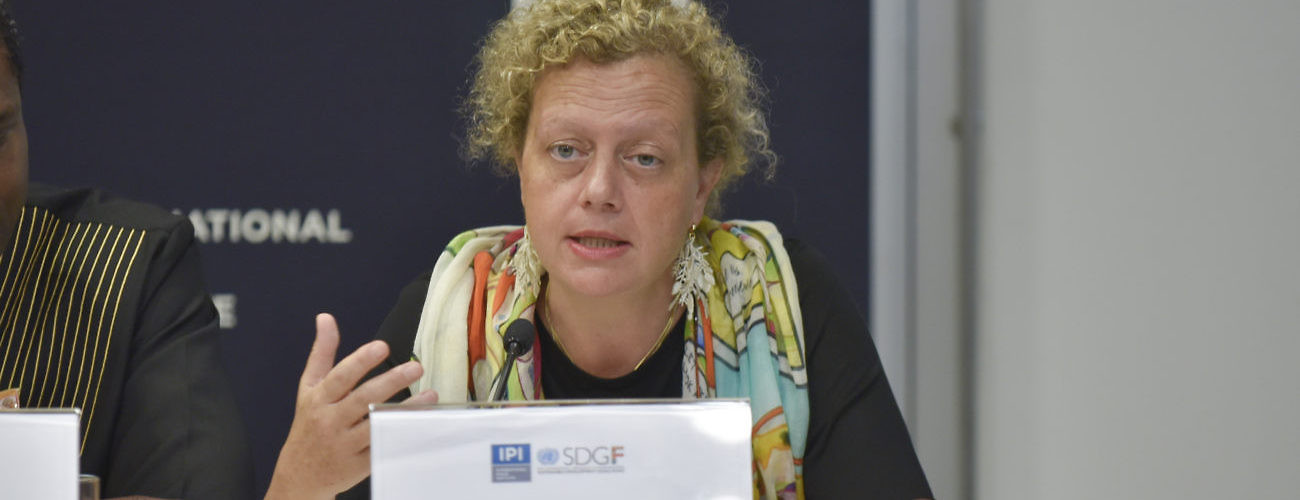“The private sector is not only a donor, it’s also an actor,” declared Paloma Durán, Director of the Sustainable Development Goals Fund. “We need to reflect and to see how to engage the private sector as an actor in our processes, meaning how to engage the private sector in the core design of programs, the implementation of the programs and core follow-up of programs in the field.”
“Moreover,” she added, “business should consider their engagement with the SDGs as a business opportunity rather than as part of their corporate social responsibility because they make good business sense.”
Ms. Durán was speaking to an IPI forum on September 23rd entitled “The Road to Peace: Why the SDGs are Good for Business,” and dedicated to discussing how business and the public sector should come together as the SDGs move from the inspirational phase of creation in 2015 to the more pragmatic phase of implementation in 2016 and beyond.
“The ambitious 2030 Agenda cannot be achieved by governments alone, the role of business is critical,” argued Thani Ahmed Al Zeyoudi, Minister of Climate Change and the Environment for the United Arab Emirates. “The good news is that the business community is ready to stand up to the challenge.”
Supporting that last point was David Nabarro, Special Adviser to the UN Secretary-General on the 2030 Agenda for Sustainable Development and Climate Change, who said that “businesses big and small are coming into the UN and saying, ‘We’re ready, we’re part of this, we’ll work with anybody.'”
“And we want to make it happen,” he continued, “because we see that this is central to the future of what good business is all about. Every day, I’ve been seeing businesses, investors, corporate representatives saying that the SDGs offer a fabulous framework for how we want to be seen as businesses, how we want our customers to perceive us, how we want our suppliers to see us, how we want governments to perceive us.”
Offering up the example of one country’s positive experience, Miguel Camilo Ruiz Blanco, the Deputy Permanent Representative of Colombia, said the National High Level Commission for the Implementation of the SDGs in Bogotá had found that of the 199 goals being pursued there, at least 88 of them required the active participation of the private sector.
Tonye Cole, CEO and founder of the Sahara Group of companies, pointed out the growing enthusiasm for business involvement. “Two years ago,” he said, “when we were here as a business trying to work with the United Nations for some common language between what we know as ‘business language’ and what multilateral agencies know as ‘government speak’, what I felt and sensed then was there was a huge mistrust between governments, businesses, and civil society.”
Then last year, he said, it changed for the better. “It wasn’t so much about mistrust, but it was about, ‘You know what, we don’t have a choice. What can we do? We actually need the private sector so let’s talk.’”
Not only that, he said, but “more importantly, I hear the talk coming from the government, and it’s different. It speaks a lot more about what the private sector can do and why it’s important.”
Rebeca Grynspan, Secretary-General of the Ibero American Conference, divided business responses into three categories. “One is things businesses need to invest in to achieve the SDGs,” she said. “The second thing is businesses can help others get what we need for the SDGs. And thirdly, things businesses need to change in the way they operate in their behavior inside their firms.”
She said that a rough estimate showed that it would take between 2 trillion and 4.5 trillion dollars a year to meet the SDGs, with a least half of it coming from the private sector. “And we don’t only need funds,” she added, “but we need ideas, we need innovation, and we need businesses to help us get more ideas and innovation for solutions to our common problems.”
Arguing that the “main mechanism for achieving a big chunk of the SDGs is employment,” she noted that 75% of the world’s workers are employed in the private sector “and the world will make significant strides if all businesses not only create employment but grant equal opportunities to all workers.”
She concluded that all these efforts were dispelling what she called the “false dichotomy between public and private.”
“Most of our countries need more and better of both,” she said. “We need more state and better state, and more private sector, not one or the other. That false dichotomy has caused a lot of wrong decisions in the past.”








